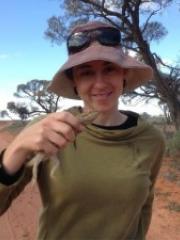Dr April Reside

Researcher biography
April Reside is a lecturer in Wildlife Science at the School of Agriculture & Food Sciences.
Dr Reside's research encompasses ecology, conservation, and policy. Recently she has worked with the National Environmental Science Programme’s Threatened Species Recovery Hub, investigating refuges and refugia; and recovery actions and their costs for Australia’s threatened species. April also works on conservation of woodland bird communities, the impact of climate change on biodiversity, and strategies for climate change adaptation, incorporating carbon sequestration. This research fed into Natural Resource Management and government planning for climate change adaptation.
April has a particular fascination of flying vertebrates, and has worked on bats on three continents. She worked as a field ecologist for Australian Wildlife Conservancy before moving to the tropics for her PhD on “Assessing Climate Change Vulnerability: Novel methods for understanding potential impacts on Australian Tropical Savanna Birds”. This work adapted species distribution modelling techniques to account for temporal and spatial variability in the distributions of highly vagile bird species. Her work helped to inform the IUCN SSC Guidelines for Assessing Species’ Vulnerability to Climate Change by the IUCN Species Survival Commission.
April serves as Chair of the Black-throated Finch Recovery Team, and as a member of the Research and Conservation Committee and Threatened Species Committee for Birdlife Australia.
Research Impacts
Dr Reside engages with environmental policy to achieve better environmental outcomes. Her work on threatened species and environmental policy has contributed to submissions to the 2019 review of Australia’s environmental laws; Australia’s threatened species strategy; Senate Inquiry on Australia’s faunal extinction crisis; Vegetation Management (Reinstatement) and Other Legislation Amendment Bill 2016; Inquiry into the impact on the agricultural sector of vegetation and land management policies, regulations and restrictions; Australia’s strategy for nature 2018-2030 and others.
| Featured projects | Duration |
|---|---|
| Saving Queensland’s earless dragons |
